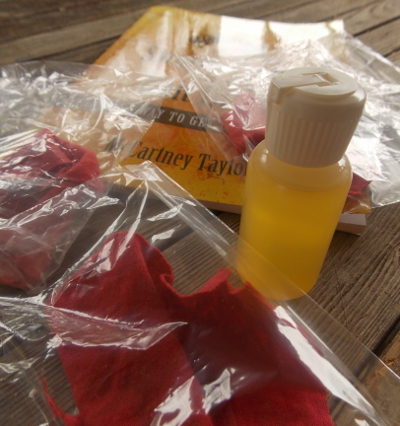
Baiting hives for swarms
 Last year, I started researching swarm traps just as the garden was heating up, so we didn't really manage to get anything going in time to catch a swarm (although a swarm did end up in the barn anyway).
But now that we have all of our ducks in a row, it's simple to bait a
few hives with lemongrass oil and hope we'll catch free bees.
Last year, I started researching swarm traps just as the garden was heating up, so we didn't really manage to get anything going in time to catch a swarm (although a swarm did end up in the barn anyway).
But now that we have all of our ducks in a row, it's simple to bait a
few hives with lemongrass oil and hope we'll catch free bees.
This is a bit early in
the year to be setting up swarm traps, but Mark noticed some honeybees
nosing around the porch over the weekend, and we wondered if they were
looking for a new hive cavity. The colony in our Warre hive
still hasn't started building comb in the empty third box, but bees
don't always read books, so it's possible the bees figured it would be
easier to swarm than to build down the way they're supposed to. I
could know for sure what's going on if I opened up the hive and looked
for developing queen cells, but I'd rather toe the Warre line and leave
the hive closed, then hedge my bets with swarm traps.
I baited three different hives, and need to put in an hour to finish building last year's real swarm trap and install it as well. It will be interesting to see which of the following a swarm of honeybees prefers:
- A Langstroth hive made up of two shallows, one box with fully drawn comb and one box empty.
- A Warre hive made up of two boxes, both with fully drawn comb.
- A top bar hive with no comb and smelling of mouse. (Over the winter, a pesky rodent nested under the lid, and even though I brushed away the nest, the scent remains.)
While this experiment
is far from scientific, I'm always curious which of the main beekeeping
methods the bees themselves would prefer, and this should give me some
indication. Here's hoping we catch a swarm early enough that it
makes it through the winter!
Want more in-depth information? Browse through our books.
Or explore more posts by date or by subject.
About us: Anna Hess and Mark Hamilton spent over a decade living self-sufficiently in the mountains of Virginia before moving north to start over from scratch in the foothills of Ohio. They've experimented with permaculture, no-till gardening, trailersteading, home-based microbusinesses and much more, writing about their adventures in both blogs and books.
Want to be notified when new comments are posted on this page? Click on the RSS button after you add a comment to subscribe to the comment feed, or simply check the box beside "email replies to me" while writing your comment.

Rebecca --- Excellent question! I'm not worried about the two colonies we lost this past winter because I know what happened to them and neither problem is contagious. One absconded this past fall, probably because I treated them for mites with powdered sugar. The other was a very late swarm that simply wasn't big enough to stay warm through the winter.
The diseases that seem to be likely to carry over in old hives (according to the literature) are the two types of foulbrood. If I had any thoughts that bees might have died of foulbrood (or if I was using equipment from an unknown source), I would definitely try to disinfect. This is the method we've used in the past to disinfect suspect equipment.
Your specific question was about viruses, though, and I've never read about any viruses that affect bees. It got me wondering, though --- could there be viruses we don't know about? Definitely worth pondering if bees die of unknown reasons.
here are some links to articles about bee viruses.
http://articles.latimes.com/2014/jan/21/science/la-sci-sn-virus-bee-colony-collapse-20140120
“I want to be cautious,” Chen said. “The cause of colony collapse disorder remains unclear. But we do have evidence that TRSV along with other viruses that we screen on a regular basis are associated with lower rates of over-winter survival.”
http://articles.latimes.com/2014/feb/19/science/la-sci-sn-colony-collapse-bumblebees-20140218
from wikipedia Additional evidence that CCD is an infectious disease came from the following observations: the hives of colonies that had died from CCD could be reused with a healthy colony only if they were first treated with DNA-destroying radiation,[98] and the CCD Working Group report in 2010 indicated that CCD-exhibiting hives tended to occur in proximity to one another within apiaries.[38]
these articles are all about ccd which I think you suspected was the case with one of your losses in a previous year. But, often times you can get just weaker bees with a virus without getting ccd. Which could contribute to a failure to survive the winter, although this winter was just crazy cold.
I do not have the option you have. You have lots of land and are out in the country. So I end up walking my dog in the neighborhood but letting her run next to the Nashville International Airport in Tennessee.
I happened upon a swarm that formed right in front of me while letting my dog run in the field. It was a cool sight. I left to go home and knowing I had a neighbor that has hives, and decided to stop and tell him about it.
He was interested and I took him to the swarm and helped him capture the hive. It was a cool experience.
So this turns out to be my hive just in his yard (he has 7 others). I will be interested in seeing how it works.
Thanks for your blog. I live vicariously through you.
Mark